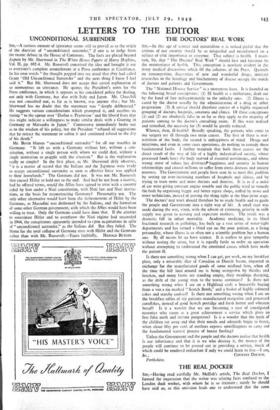LETTERS TO THE EDITOR
UNCONDITIONAL SURRENDER •
Sia,—A curious amount of ignorance seems still to prevail as to the origin of the doctrine of "unconditional surrender," if one is to judge from the recent debate in thc House of Commons. The facts are placed beyond dispute by Mr. Sherwood in The White house Papers of Harry Hopkins, Vol. II, pp. 692-4. Mr. Roosevelt conceived the idea and brought it out to everyone's complete astonishment at a Press conference at Casablanca. In his own words "the thought popped into my mind that they had called Grant Old Unconditional Surrender' and the next thing I knew I had said it." But Mr. Sherwood does not accept that casual explanation of so momentous an utterance. He quotes the President's notes for the Press conference, in which it appears as his considered policy for dealing, not only with Germany, but also with Italy and Japan. Mr. Churchill was not consulted nor, as far as is known, was anyone else ; but Mr. Sherwood has no doubt that the statement was "deeply deliberated." He suggests various considerations which prompted it, and ascribes its timing "to the uproar over 'Dalian v. Peyrovton ' and the liberal fears that this might indicate a willingness to make similar deals with a Goering in Germany or Matsuoka in japan." Controversy immediately broke out as to the wisdom of his policy, but the President "refused all suggestions that he retract the statement or soften it and continued refusal to the diy of his death."
Mr. Bevin blames "unconditional surrender" for all our troubles in Germany. "It left us with a Germany without law, without a con- stitution, without a single person with whom we could deal, without a single institution to grapple with the situation." But is the explanation really so simple? In the first place, as Mr. Sherwood drily observes, "it is a matter of record that the Italians and the Japanese were ready to accept unconditional surrender as soon as effective force was applied to their homelands." The Germans did not. It was not Mr. Roosevelt that caused Hitler to hold out to the end. And had he not been a maniac, had he offered terms, would the Allies have agreed to treatswith a country ruled by him under a Nazi constitution, with Nazi Law and Nazi institu- tions, as the basis for reconstructing Germany? Presumably not. The only other alternative would have been the dethronement of Hider by the Germans, as Mussolini was dethroned by the Italians, and the formation of some other German government, with which the Allies would have been willing to treat.. Only the Germans could have done that. If the attempt to assassinate Hitler and to overthrow the Nazi regime had succeeded in 1944, the conspirators apparently intended to cpen thgotiations in spite of "unconditional surrender," as the Italians did. But they failed. The blame for the total collapse of Germany rests with Hitler and the Germans rather than with Mr. Roosevelt. —Yours faithfully, /haw) Btrrnix.


































 Previous page
Previous page